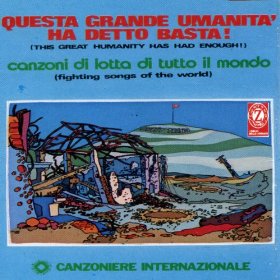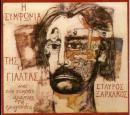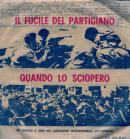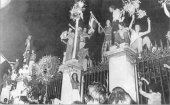Το μεσημέρι χτυπάνε στο γραφείο
μετρώ τους χτύπους τον πόνο μετρώ
είμαι θρεφτάρι μ' έχουν κλείσει στο σφαγείο
σήμερα εσύ αύριο εγώ
Χτυπούν το βράδυ στην ταράτσα τον Ανδρέα
μετρώ τους χτύπους το αίμα μετρώ
πίσω απ' τον τοίχο πάλι θα 'μαστε παρέα
τακ τακ εσύ τακ τακ εγώ
Που πάει να πει
σ' αυτή τη γλώσσα τη βουβή
βαστάω γερά, κρατάω καλά
Μες στις καρδιές μας αρχινάει το πανηγύρι
τακ τακ εσύ τακ τακ εγώ
τακ τακ εσύ τακ τακ εγώ
Μύρισε το σφαγείο μας θυμάρι
και το κελί μας κόκκινο ουρανό
Μύρισε το σφαγείο μας θυμάρι
και το κελί μας κόκκινο ουρανό
Χτυπούν το βράδυ στην ταράτσα τον Ανδρέα
μετρώ τους χτύπους το αίμα μετρώ
πίσω απ' τον τοίχο πάλι θα 'μαστε παρέα
τακ τακ εσύ τακ τακ εγώ
Που πάει να πει
σ' αυτή τη γλώσσα τη βουβή
βαστάω γερά, κρατάω καλά
Μύρισε το σφαγείο μας θυμάρι
και το κελί μας κόκκινο ουρανό
Μύρισε το σφαγείο μας θυμάρι
και το κελί μας κόκκινο ουρανό
μετρώ τους χτύπους τον πόνο μετρώ
είμαι θρεφτάρι μ' έχουν κλείσει στο σφαγείο
σήμερα εσύ αύριο εγώ
Χτυπούν το βράδυ στην ταράτσα τον Ανδρέα
μετρώ τους χτύπους το αίμα μετρώ
πίσω απ' τον τοίχο πάλι θα 'μαστε παρέα
τακ τακ εσύ τακ τακ εγώ
Που πάει να πει
σ' αυτή τη γλώσσα τη βουβή
βαστάω γερά, κρατάω καλά
Μες στις καρδιές μας αρχινάει το πανηγύρι
τακ τακ εσύ τακ τακ εγώ
τακ τακ εσύ τακ τακ εγώ
Μύρισε το σφαγείο μας θυμάρι
και το κελί μας κόκκινο ουρανό
Μύρισε το σφαγείο μας θυμάρι
και το κελί μας κόκκινο ουρανό
Χτυπούν το βράδυ στην ταράτσα τον Ανδρέα
μετρώ τους χτύπους το αίμα μετρώ
πίσω απ' τον τοίχο πάλι θα 'μαστε παρέα
τακ τακ εσύ τακ τακ εγώ
Που πάει να πει
σ' αυτή τη γλώσσα τη βουβή
βαστάω γερά, κρατάω καλά
Μύρισε το σφαγείο μας θυμάρι
και το κελί μας κόκκινο ουρανό
Μύρισε το σφαγείο μας θυμάρι
και το κελί μας κόκκινο ουρανό
inviata da Alessandro - 10/1/2007 - 23:17
Lingua: Greco moderno (Romanized)
Trascrizione fonetica di massima del testo originale:
TO SFAJIO
To mesiméri χtypáne sto γrafío
metró tus χtýpus, to(m) bóno metró
íme ϑreftári m'éχu(n) glísi sto sfajío
símera esý, ávrio eγó
χtypún to vráδy sti(n) darátsa ton A(n)δréa
metró tus χtýpus to éma metró
píso ap'to(n) díχo pálji ϑa'maste paréa
tak tak esý tak tak eγó
Pu pái na pi
s'aftí ti γlóssa ti vuví
vastáo jerá, kratáo kalá
Mes stis karδjés mas arχinái to panjijýri
tak tak esý tak tak eγó
tak tak esý tak tak eγó
Mýrise to sfajío mas ϑymári
kje to kjeljí mas kókino uranó
Mýrise to sfajío mas ϑymári
kje to kjeljí mas kókino uranó
χtypún to vráδy sti(n) darátsa ton A(n)δréa
metró tus χtýpus to éma metró
píso ap'to(n) díχo pálji ϑa'maste paréa
tak tak esý tak tak eγó
Pu pái na pi
s'aftí ti γlóssa ti vuví
vastáo jerá, kratáo kalá
Mýrise to sfajío mas ϑymári
kje to kjeljí mas kókino uranó
Mýrise to sfajío mas ϑymári
kje to kjeljí mas kókino uranó.
To mesiméri χtypáne sto γrafío
metró tus χtýpus, to(m) bóno metró
íme ϑreftári m'éχu(n) glísi sto sfajío
símera esý, ávrio eγó
χtypún to vráδy sti(n) darátsa ton A(n)δréa
metró tus χtýpus to éma metró
píso ap'to(n) díχo pálji ϑa'maste paréa
tak tak esý tak tak eγó
Pu pái na pi
s'aftí ti γlóssa ti vuví
vastáo jerá, kratáo kalá
Mes stis karδjés mas arχinái to panjijýri
tak tak esý tak tak eγó
tak tak esý tak tak eγó
Mýrise to sfajío mas ϑymári
kje to kjeljí mas kókino uranó
Mýrise to sfajío mas ϑymári
kje to kjeljí mas kókino uranó
χtypún to vráδy sti(n) darátsa ton A(n)δréa
metró tus χtýpus to éma metró
píso ap'to(n) díχo pálji ϑa'maste paréa
tak tak esý tak tak eγó
Pu pái na pi
s'aftí ti γlóssa ti vuví
vastáo jerá, kratáo kalá
Mýrise to sfajío mas ϑymári
kje to kjeljí mas kókino uranó
Mýrise to sfajío mas ϑymári
kje to kjeljí mas kókino uranó.
inviata da Riccardo Venturi - 11/1/2007 - 11:31
Lingua: Italiano
Sul sito di Cantovivo è presente la seguente traduzione [letterale] in italiano, che è stata ristrutturata per seguire meglio il testo originale:
Theodorakis si schiera contro i colonnelli del colpo di stato in Grecia di fine Anni ‘60: dopo pochi mesi passati in clandestinità viene arrestato, condotto nel carcere Avìroff, poi detenuto nelle carceri di Korydallos, mattatoio di molti suoi compagni di lotta, come l’Andreas Lentakis raccontato da questa sua canzone, che in originale si intitola “Il mattatoio” ed è così:
IL MATTATOIO
A mezzogiorno torturano nell’ufficio,
conto i colpi, misuro la sofferenza.
Sono una bestia che menano al macello,
quest’oggi a te, domani tocca a me.
Stasera torturano Andreas sulla terrazza,
conto i colpi, misuro il sangue.
Ci troveremo insieme di nuovo accanto al muro
tac-tac le tue dita, tac-tac le mie dita
Che significa
in questa lingua muta:
resisto bene, stai tranquillo, non cedo.
Comincia la sagra dentro i nostri cuori:
tac-tac fai tu, tac- tac rispondo io,
tac-tac fai tu, tac-tac rispondo io.
Profuma[va] di timo il mattatoio
e nella nostra cella è un cielo color sangue
Profuma[va] di timo il mattatoio
e nella nostra cella è un cielo color sangue
Stasera torturano Andreas sulla terrazza,
conto i colpi, misuro il sangue.
Ci troveremo insieme di nuovo accanto al muro
tac-tac le tue dita, tac-tac le mie dita
Che significa
in questa lingua muta:
resisto bene, stai tranquillo, non cedo.
Profuma[va] di timo il mattatoio
e nella nostra cella è un cielo color sangue
Profuma[va] di timo il mattatoio
e nella nostra cella è un cielo color sangue.
A mezzogiorno torturano nell’ufficio,
conto i colpi, misuro la sofferenza.
Sono una bestia che menano al macello,
quest’oggi a te, domani tocca a me.
Stasera torturano Andreas sulla terrazza,
conto i colpi, misuro il sangue.
Ci troveremo insieme di nuovo accanto al muro
tac-tac le tue dita, tac-tac le mie dita
Che significa
in questa lingua muta:
resisto bene, stai tranquillo, non cedo.
Comincia la sagra dentro i nostri cuori:
tac-tac fai tu, tac- tac rispondo io,
tac-tac fai tu, tac-tac rispondo io.
Profuma[va] di timo il mattatoio
e nella nostra cella è un cielo color sangue
Profuma[va] di timo il mattatoio
e nella nostra cella è un cielo color sangue
Stasera torturano Andreas sulla terrazza,
conto i colpi, misuro il sangue.
Ci troveremo insieme di nuovo accanto al muro
tac-tac le tue dita, tac-tac le mie dita
Che significa
in questa lingua muta:
resisto bene, stai tranquillo, non cedo.
Profuma[va] di timo il mattatoio
e nella nostra cella è un cielo color sangue
Profuma[va] di timo il mattatoio
e nella nostra cella è un cielo color sangue.
inviata da Alessandro + RV - 10/1/2007 - 23:22
Lingua: Italiano
Trasposizione in italiano di Leoncarlo Settimelli e Curci
Rielaborazione musicale di Alberto Cesa
Dal disco "Contro-canto popolare" - Dischi del Manifesto. Incisa per la prima volta dal Canzoniere Internazionale in Questa grande umanità ha detto basta - Dischi dello Zodiaco VPA 8142.
Rielaborazione musicale di Alberto Cesa
Dal disco "Contro-canto popolare" - Dischi del Manifesto. Incisa per la prima volta dal Canzoniere Internazionale in Questa grande umanità ha detto basta - Dischi dello Zodiaco VPA 8142.
La traduzione è riportata anche in: Leoncarlo Settimelli, Il '68 cantato (e altre stagioni), pp. 138/139
ANDREA
Sulla terrazza stanno torturando Andrea
chi può giurare che lo rivedrò
Come le bestie siamo dentro un mattatoio
colpo su colpo il sangue conterò
Scende la notte e stanno riportando Andrea
quest’oggi a te domani tocca a me
di là del muro siamo un’altra volta insieme
ta-ta sei qui ta-ta son qua
E per noi vuol dire io resisterò
ta-ta per te ta-ta per me
Nei nostri cuori è cominciata una gran festa
ta-ta per te ta-ta per me
ta-ta ta-ta "non parlerò"
Il mattatoio adesso è una montagna
ed il nemico lo aspettiamo noi
il cielo è rosso e accende una speranza
e come Andrea nessuno parlerà
e come Andrea nessuno parlerà
Sulla terrazza stanno torturando Andrea
chi può giurare che lo rivedrò
Come le bestie siamo dentro un mattatoio
colpo su colpo il sangue conterò
Scende la notte e stanno riportando Andrea
quest’oggi a te domani tocca a me
di là del muro siamo un’altra volta insieme
ta-ta sei qui ta-ta son qua
E per noi vuol dire io resisterò
ta-ta per te ta-ta per me
Nei nostri cuori è cominciata una gran festa
ta-ta per te ta-ta per me
ta-ta ta-ta "non parlerò"
Il mattatoio adesso è una montagna
ed il nemico lo aspettiamo noi
il cielo è rosso e accende una speranza
e come Andrea nessuno parlerà
e come Andrea nessuno parlerà
inviata da Alessandro - 10/1/2007 - 23:24
Lingua: Francese
Version française – L'ABATTOIR – Marco Valdo M.I. – 2012
d'après la version italienne de Riccardo Venturi, IL MATTATOIO
d'une chanson grecque Το σφαγείο de Mikis Theodorakis / Mίκης Θεοδωράκης

d'après la version italienne de Riccardo Venturi, IL MATTATOIO
d'une chanson grecque Το σφαγείο de Mikis Theodorakis / Mίκης Θεοδωράκης

Andreas Lentakis.
Écrite par Théodorakis dans les prisons de la police d'Athènes, après le coup d'État des colonels grecs du 21 avril 1967 et dédiée à un jeune communiste torturé afin qu'il révèle les noms de ses camarades. Ce jeune homme était Andreas Lentakis (o Lendakis, Ledakis) [1935-1997]. Ανδρέας Λεντάκης [1935-1997].
L'ABATTOIR
À midi, ils torturent dans le bureau,
Je compte les coups, je mesure la souffrance.
Je suis une bête qu'ils mènent à l'abattoir,
Aujourd'hui, c'est à toi, demain c'est à moi.
Ce soir, ils torturent Andreas sur la terrasse,
Je compte les coups, je mesure le sang.
Nous nous retrouverons ensemble au travers du mur
Tac-tac tes doigts, tac-tac mes doigts
Comment dire
dans cette langue muette:
Je résiste bien, ne t'inquiète pas, je ne cède pas.
C'est la fête dans nos coeurs:
Tu fais tac-tac, tac - tac je réponds,
Tu fais tac-tac, tac - tac je réponds.
Parfum de thym à l'abattoir
Et dans notre cellule, le ciel couleur sang
Parfum de thym à l'abattoir
Et dans notre cellule, le ciel couleur sang
Ce soir, ils torturent Andreas sur la terrasse,
Je compte les coups, je mesure le sang.
Nous nous retrouverons ensemble au travers du mur
Tac-tac tes doigts, tac-tac mes doigts
Comment dire
dans cette langue muette:
Je résiste bien, ne t'inquiète pas, je ne cède pas.
Comment dire
dans cette langue muette:
Je résiste bien, ne t'inquiète pas, je ne cède pas.
Parfum de thym à l'abattoir
Et dans notre cellule, le ciel couleur sang
Parfum de thym à l'abattoir
Et dans notre cellule, le ciel couleur sang
ANDREA
Transposition en italien de Leoncarlo Settimelli et Curci
Adapatation musicale d'Alberto Cesa
Sur la terrasse, ils torturent Andréa
Aujourd'hui c'est toi, demain c'est moi
Au delà du mur, nous sommes encore une fois ensemble
Ta-ta-ta tu es là, ta-ta-ta je suis ici
Et pour nous, ça veut dire je résisterai
Ta-ta-ta pour toi, ta-ta-ta pour moi.
La nuit descend et ramène Andréa
Aujourd'hui c'est toi, demain c'est moi
Au travers du mur, nous sommes ensemble encore une fois.
Ta-ta-ta tu es là, ta-ta-ta je suis ici
Et pour nous, ça veut dire je résisterai
Ta-ta-ta pour toi, ta-ta-ta pour moi.
Dans nos cœurs, une grande fête commence
Ta-ta-ta-ta pour toi ta-ta-ta-ta pour moi
Ta-ta-ta-ta ta-ta-ta-ta « je ne parlerai pas ».
L'abattoir maintenant est une montagne
Et nous attendons l'ennemi
Le ciel est rouge et s'allume l'espoir
Tout comme Andréa personne ne parlera
Tout comme Andréa personne ne parlera
À midi, ils torturent dans le bureau,
Je compte les coups, je mesure la souffrance.
Je suis une bête qu'ils mènent à l'abattoir,
Aujourd'hui, c'est à toi, demain c'est à moi.
Ce soir, ils torturent Andreas sur la terrasse,
Je compte les coups, je mesure le sang.
Nous nous retrouverons ensemble au travers du mur
Tac-tac tes doigts, tac-tac mes doigts
Comment dire
dans cette langue muette:
Je résiste bien, ne t'inquiète pas, je ne cède pas.
C'est la fête dans nos coeurs:
Tu fais tac-tac, tac - tac je réponds,
Tu fais tac-tac, tac - tac je réponds.
Parfum de thym à l'abattoir
Et dans notre cellule, le ciel couleur sang
Parfum de thym à l'abattoir
Et dans notre cellule, le ciel couleur sang
Ce soir, ils torturent Andreas sur la terrasse,
Je compte les coups, je mesure le sang.
Nous nous retrouverons ensemble au travers du mur
Tac-tac tes doigts, tac-tac mes doigts
Comment dire
dans cette langue muette:
Je résiste bien, ne t'inquiète pas, je ne cède pas.
Comment dire
dans cette langue muette:
Je résiste bien, ne t'inquiète pas, je ne cède pas.
Parfum de thym à l'abattoir
Et dans notre cellule, le ciel couleur sang
Parfum de thym à l'abattoir
Et dans notre cellule, le ciel couleur sang
ANDREA
Transposition en italien de Leoncarlo Settimelli et Curci
Adapatation musicale d'Alberto Cesa
Sur la terrasse, ils torturent Andréa
Aujourd'hui c'est toi, demain c'est moi
Au delà du mur, nous sommes encore une fois ensemble
Ta-ta-ta tu es là, ta-ta-ta je suis ici
Et pour nous, ça veut dire je résisterai
Ta-ta-ta pour toi, ta-ta-ta pour moi.
La nuit descend et ramène Andréa
Aujourd'hui c'est toi, demain c'est moi
Au travers du mur, nous sommes ensemble encore une fois.
Ta-ta-ta tu es là, ta-ta-ta je suis ici
Et pour nous, ça veut dire je résisterai
Ta-ta-ta pour toi, ta-ta-ta pour moi.
Dans nos cœurs, une grande fête commence
Ta-ta-ta-ta pour toi ta-ta-ta-ta pour moi
Ta-ta-ta-ta ta-ta-ta-ta « je ne parlerai pas ».
L'abattoir maintenant est une montagne
Et nous attendons l'ennemi
Le ciel est rouge et s'allume l'espoir
Tout comme Andréa personne ne parlera
Tout comme Andréa personne ne parlera
inviata da Marco Valdo M.I. - 1/4/2012 - 12:22
Lingua: Ungherese
Magyar nyelvre fordította Riccardo Venturi
2009-01-30án
2009-01-30án
A VÁGÓHÍD
Délben megkínoznak az irodában
az ütéseket és a szenvedést mérem.
Vágóállat vagyok amit vágóhídra visznek
ma rajtam a sor, holnap rajtad
Ma este Andrást megkínozzák a teraszon
az ütéseket és a vért mérem.
A fal mellett aztán újra találkozunk:
Ták-ták újjaiddal, ták-ták újjaimmal.
És ez jelent
ezen a néma nyelven:
jól vagyok, tartok ki.
A szívünkben kezdődik az újjünnep:
ták-ták újjaiddal, ták-ták újjaiddal,
ták-ták újjaiddal, ták-ták újjaiddal.
A vágóhíd kakukkfűillatot árasztott,
a zárkánkban vérszínű ég van,
A vágóhíd kakukkfűillatot árasztott,
a zárkánkban vérszínű ég van.
Ma este Andrást megkínozzák a teraszon
az ütéseket és a vért mérem.
A fal mellett aztán újra találkozunk:
Ták-ták újjaiddal, ták-ták újjaimmal.
És ez jelent
ezen a néma nyelven:
jól vagyok, tartok ki.
A vágóhíd kakukkfűillatot árasztott,
a zárkánkban vérszínű ég van,
A vágóhíd kakukkfűillatot árasztott,
a zárkánkban vérszínű ég van.
Délben megkínoznak az irodában
az ütéseket és a szenvedést mérem.
Vágóállat vagyok amit vágóhídra visznek
ma rajtam a sor, holnap rajtad
Ma este Andrást megkínozzák a teraszon
az ütéseket és a vért mérem.
A fal mellett aztán újra találkozunk:
Ták-ták újjaiddal, ták-ták újjaimmal.
És ez jelent
ezen a néma nyelven:
jól vagyok, tartok ki.
A szívünkben kezdődik az újjünnep:
ták-ták újjaiddal, ták-ták újjaiddal,
ták-ták újjaiddal, ták-ták újjaiddal.
A vágóhíd kakukkfűillatot árasztott,
a zárkánkban vérszínű ég van,
A vágóhíd kakukkfűillatot árasztott,
a zárkánkban vérszínű ég van.
Ma este Andrást megkínozzák a teraszon
az ütéseket és a vért mérem.
A fal mellett aztán újra találkozunk:
Ták-ták újjaiddal, ták-ták újjaimmal.
És ez jelent
ezen a néma nyelven:
jól vagyok, tartok ki.
A vágóhíd kakukkfűillatot árasztott,
a zárkánkban vérszínű ég van,
A vágóhíd kakukkfűillatot árasztott,
a zárkánkban vérszínű ég van.
Greece had two leaders who really took care of the People. Perikles in the ancient Greece and Andreas Papandreou in modern Greece. I have been looking for this song a lot. I am grateful to you to let me download it.
George Maragozis - 2/2/2007 - 22:06
Το σφαγείο eseguita in una piazza siriana:
(segnalazione di Margarita Aspasia Theodoraki)
(segnalazione di Margarita Aspasia Theodoraki)
Gian Piero Testa - 30/3/2012 - 14:52
Occorre una correzione: la canzone non è eseguita in Siria, ma come chiaramente si vede nel video, ad a Atene. Canta TAREQ HANOUF e lo ascoltano immigrati, probabilmente siriani.
Gian Piero Testa - 30/3/2012 - 15:12
"Il mattatoio", la versione italiana di Leoncarlo Settimelli, dal disco del Canzoniere Internazionale intitolato “Questa grande umanità ha detto Basta! - Canzoni di lotta di tutto il mondo”, pubblicato da I Dischi Dello Zodiaco nel 1972.


Bernart Bartleby - 12/8/2014 - 22:13
×
![]()










[1968]
Στίχοι: Μίκης Θεοδωράκης
Από τα Τραγούδια για τον Αντρέα Λεντάκη
Μουσική: Μίκης Θεοδωράκης
Πρώτη εκτέλεση: Μίκης Θεοδωράκης
'Αλλη ερμηνεία: Αντώνης Καλογιάννης
Testo e musica: Mikis Theodorakis
dalle Canzoni per Andreas Lendakis
Primo interprete: Mikis Theodorakis
Altro interprete: Andonis Kaloyannis
Lyrics and music: Mikis Theodorakis
From the Songs for Andreas Lentakis
First performed by: Mikis Theodorakis
Also performed by: Andonis Kaloyannis
"Scritta da Theodorakis nelle prigioni della questura di Atene, dopo il colpo di Stato dei colonnelli greci, e dedicata ad un giovane comunista torturato perchè rivelasse il nome dei suoi compagni" (Nota al testo della canzone inclusa nel disco "Questa grande umanità ha detto basta! - Canzoni di lotta di tutto il mondo", Il Canzoniere Internazionale, I Dischi dello Zodiaco). Il testo greco proviene da questa pagina.
Secondo quanto riportato sul sito dei Cantovivo, il nome del giovane attivista torturato sarebbe Andreas Lentakis... Tanto per ricordarsi qualche volta i nomi di coloro che per la libertà e contro i fascismi resistettero anche a costo della vita, nomi che spesso giacciono dimenticati... [Alessandro]
La traduzione italiana di Leoncarlo Settimelli e Curci, rielaborata musicalmente da Alberto Cesa ed eseguita da Cantovivo era stata a suo tempo inserita come canzone autonoma. Viene qui ricondotta alla sua natura di traduzione ed inserita di seguito al testo originale greco. La pagina autonoma è stata ovviamente soppressa. [RV]
THE SCIENTIST, THE POLITICIAN, THE THINKER, THE MAN
from the Official Website of the Lentakis Foundation
Andreas Lentakis, a Greek expatriate, was born in 1935 in Antis Abeba, Ethiopia. Although his roots were in the islands of Karpathos and Crete, he grew up and graduated from high school in Ethiopia. He enrolled at the University of Athens in 1953 to study Philosophy with a scholarship from the Greek-Ethiopian Community. His social activism and the depth of his intellectual thinking had already distinguished Andreas Lentakis by the time of his graduation from the Department of History and Archaeology. In addition he was fluent in Greek, English, French, Spanish, Italian and Ethiopian. Most importantly he was one of the leading figures of the students' movement in the 1950s and 1960s. He was the man behind the political slogans "1-1-4" and "15% dowry to education and not to Princess Sophia", which marked a whole era.
His political activism began in 1955 when he became a member of EPON, an outlawed political movement. From 1958 onwards he was a member of the Youth Movement of the Left Political Party EDA. He was one of the founding members and head of International Affairs of DESPA. In addition he was a founding member and Secretary General of the Students Union in the School of Philosophy, a founding member of the Association of Working Students, as well as for some time chief-editor of "Panspoudastiki", the student movement's magazine. Andreas Lentakis was also a leading figure of the "G. Lambrakis" Democratic Youth Movement.
Andreas Lentakis was known world-wide for his revolutionary activism against the Colonels' junta who overthrew the Greek democratic government in 1967 and imposed military rule in Greece till 1974. For this activism he was imprisoned and exiled for 4 years. At that time Mikis Theodorakis composed "Andreas' Songs" to commemorate his ardent democratic convictions and the tortures he suffered in the hands of the military police as a result.
The junta sent Andreas Lentakis into political exile to the islands of Andros, Milos, Leros and to Oropos in mainland Greece. In Milos he engaged in and promoted research and writing on the island's history. After the collapse of the military junta in 1974 and the restoration of democracy in Greece, Andreas Lentakis became a founding member of the new EDA political party and its Chairman from 1987 to 1993. He was repeatedly elected Mayor in the City of Hymittos, in the outskirts of Athens, in 1978, 1982 and again in 1986.
During his service as Mayor Andreas Lentakis founded the first "Open University" in Hymittos, an institution which he also introduced throughout Greece and in the Greek communities in Belgium, Germany, Cyprus and elsewhere. He inspired and created the first municipal KAPI (Open Care for the Third Age), the "Theatre of the Rocks" with 3,000 seats and many other innovative social and cultural programmes.
In the late 1980s and early 1990s Andreas' political activism entered a new phase. He was a member of the Executive Committee of the Sinaspismos (Coalition) Party and in
1989 and 1990 was elected as a member of the Greek Parliament.
In June 1993, after resigning from the Parliament and the Chairmanship of EDA, he joined the newly established political party of "Politiki Anixi" (Political Spring). In the October 1993 elections he received the highest number of votes and was named Parliamentary Speaker of the Party.
However, Andreas Lentakis did not limit himself to the political arena only. He published hundreds of scientific articles and over thirty books, including: "Anakreon and Anakreontia" (1974), "Illegal Organizations and April 21st" (1975), "Panayis Lekatsas, Founder of Ethnology in Greece" (1970), "The gentlemen of Milos and their coat of arms" (1983), "Democracy and local self-goverment" (1986), "Greek Anthology" (five publications), "Has Marx said everything?" (1990), "Sacred Prostitution" (1990).
Unfortunately, Andreas Lentakis did not have the happiness of seeing his life's work "Love in Ancient Greece" published. The publication of the work in a series of volumes began in 1997 by Kastaniotis Publications, starting with volume A "Love in Religion or the Ideology of Love"; volume B "The period before Patriarchy"; volume C "Prostitution" and lastly volume D "The Courtesans".
Andreas Lentakis protected human rights and dignity with his theories and actions during his lifetime.